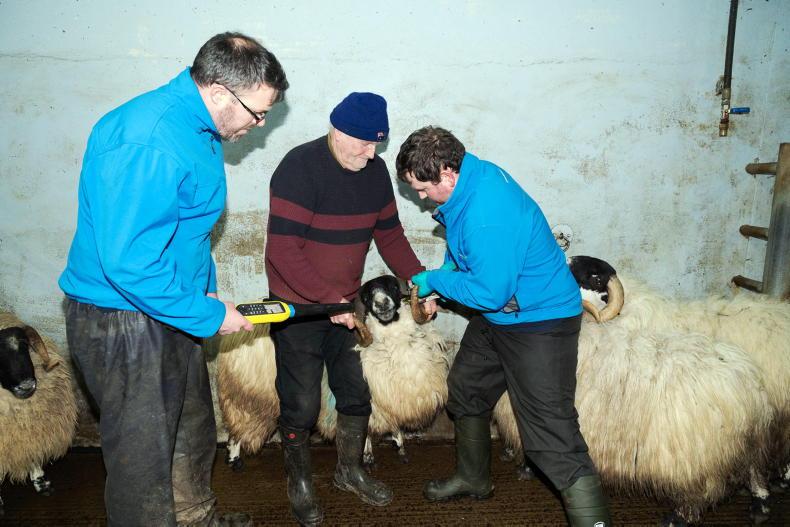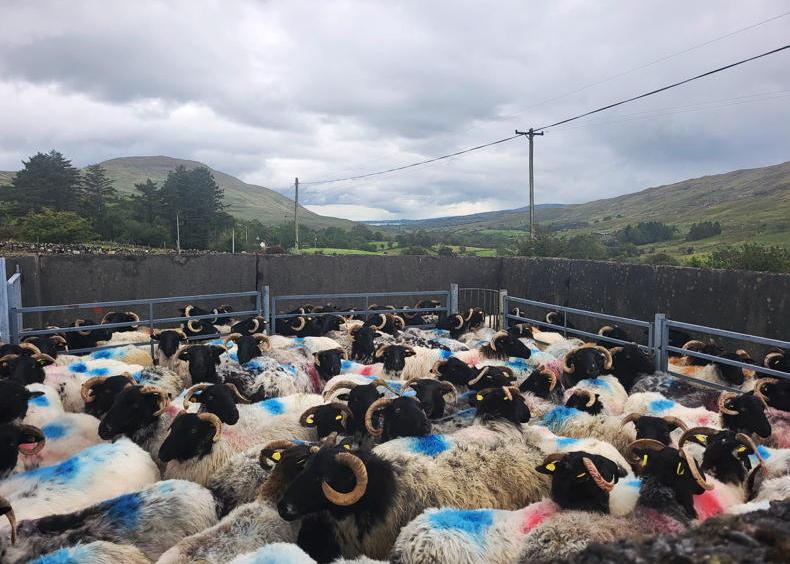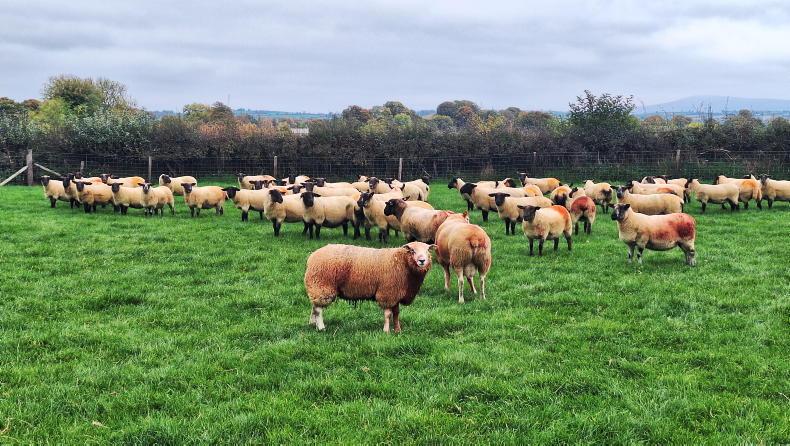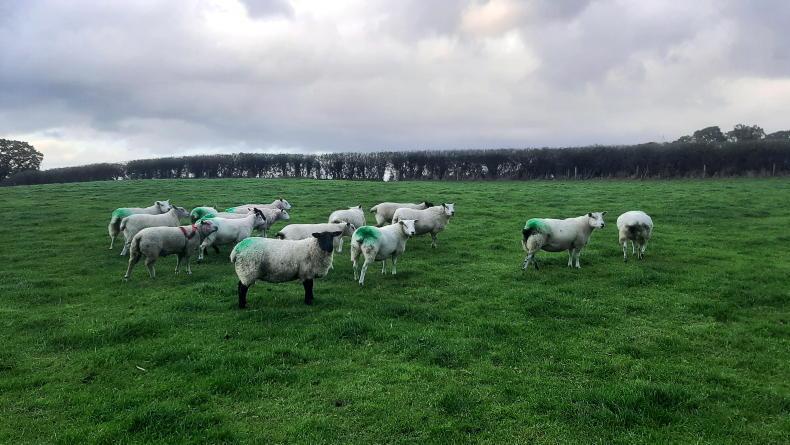The Sheep Improvement Scheme, which started on 1 February 2023, requires each of the 19,165 farmers participating to purchase an eligible ram in the first three years of the scheme. Flocks with more than 150 ewes are required to purchase a second such ram in year four or five of the scheme.
Rams must be genomically tested with Sheep Ireland and be categorised as Type I, II or III for scrapie. Lowland rams must also be rated as four- or five-star on the replacement or terminal index at the time of purchase.
In the case of hill rams, the requirement is that rams must be DNA sire-verified, so Sheep Ireland must have DNA for the ram you are selling and its sire on their database, and again also categorised as Type I, II or III for scrapie status. Hill sheep farmers operating a crossbreeding programme can also opt to purchase a lowland ram possessing the credentials laid out above.
Selecting rams
for genotyping
Sheep Ireland manager Kevin McDermott says the organisation has been receiving a relatively high level of enquiries in recent months regarding the selection of rams for genotyping. In a lowland context, many queries relate to asking if breeders should just genotype their four- and five-star rams.
Kevin says that such a practice will give a good chance of identifying four- and five-star rams but if you stick to this cohort alone, then there is a good chance you could be failing to identify additional rams. This is due to the fact that when you genotype an animal, its evaluation or star rating can change as more information becomes available on its genetic potential.
Sheep Ireland data shows that one in three rams will increase by about 10% on their rankings after genotyping. It must also be highlighted that there is a flip side to the statement and that one in three rams on average will also reduce in the rankings by 10% following genomic information being fed in to genetic evaluations. This is outlined in Table 1, which shows the probability of different shifts in the star rating of animals.
“If you genotype some four-star rams there is a reasonable chance some could drop to three stars but if you do some threes they could increase to four [stars]. So, if you want to maximise the number of animals you have available for the scheme, you need to consider genotyping a portion of your three-stars as well.”
Timing of genotyping
Sheep Ireland is advising breeders to start the genotyping process if not already in progress. The organisation says this will ensure data is available in sufficient time for sale days and also leave sufficient time for any possible issues to be addressed.
A high percentage of lowland flocks are aware of the fact that genotyping of stock rams is critical as it is a condition of the LambPlus programme and is required to receive star ratings on your animals. At the end of last year, in excess of 85% of stock rams were genotyped, with over 6,000 pedigree animals genotyped in 2022, bringing total numbers to in excess of 70,000 genotyped sheep in the national database. The situation in hill flocks is significantly different, with only two groups linked in with the Sheep Ireland breeding improvement programme heretofore.

Sheep Ireland taking samples of Ram DNA at Stranorlar and Ballybofey Livestock Mart on Friday last. \ Clive Wasson.
It is essential for hill flocks that stock rams to be genotyped as soon as possible to safeguard against the risk of stock rams dying unexpectedly without genotyping rendering their progeny ineligible for the scheme. Once a ram is genotyped it is done for life and any progeny that ram breeds can be DNA sire-verified once they too are genotyped.
Genotyping options
Sheep Ireland is keen to assist hill sheep flocks in coming to terms with the new requirements and is offering free stock ram genotyping to all group members across the 17 hill groups established at present. Rams must be 100% of a hill breed and born in 2021 or any previous year. It also held a number of successful events in marts/collection areas where farmers could bring rams to be genotyped. These events are continuing and Kevin advises interested breeders to stay in contact with their group regarding upcoming dates.
The full cost of genotyping is €24.50/sheep. This cost covers the DNA sampling tag, postage costs for submitting the sample, the genotyping process and the processing of results.
Sheep Ireland is currently subsidising the cost of genotyping by €9.50/head for LambPlus flocks and hill sheep farmers who are members of groups signed up to participate with Sheep Ireland, which brings the cost to €15/head.
Ordering process
Sheep Ireland has a genomic ordering screen where breeders can select animals they wish to genotype. This facility is open to both LambPlus and non-LambPlus members.
The process is relatively straightforward – login to your Sheep Ireland account and select the animals you require from the genomic ordering screen.
There is also a link on the website homepage, www.sheep.ie, where hill sheep flocks can register with Sheep Ireland and order genotype kits.
Note that you will need your Department identifier (flock, herd number, designator, etc) and details of the rams you wish to genotype including the full tag NSIS number, the animal’s pedigree number, date of birth (year of birth is sufficient if DOB unknown) and breed.
The breeder’s name is also required if not a homebred ram, while optional additional information includes sire and dam details for the sheep in question.
Once the ordering process starts, it must be concluded so it is important to have all data to hand. If breeders have specific queries they can contact query@sheep.ie or 023-882 0451.
DNA combo tags
Breeders who ordered DNA combo tags or sheep tissue tags should be mindful that the lambing event needs to first be recorded followed by ordering the genomic service and then posting the samples to Weatherbys Scientific. This can be completed on your Sheep Ireland account through the management portal and genomic ordering. Simply tick the option “I have some samples in storage” followed by “I already have an ear sample” when selecting the animals for genotyping.
DQI and weighing
The data quality index (DQI) is a measure of the range and completeness of information collected in a flock. Its aim is to ensure a high standard of data integrity and a minimum DQI of 75% is required for breeders to present sheep in the annual Sheep Ireland multibreed sale, while €uro-Star indices will not be published where a breeder’s DQI is lower than 40%.
Sheep Ireland is putting a renewed focus on weighing in 2023, with breeders participating in LambPlus asked to record at least three weights for their lambs. The optimum timing is a 40-day weight, 100-day weight and a 150-day weight.
The timeframe for collecting these weights is detailed in Table 2, while Table 3 outlines a handy ready reckoner of dates. The weights will work towards improving a flock’s accuracy percentage and Kevin explains will better reflect the performance of animals on the ground more accurately.
Ewe mature weights
Sheep Ireland is also keen to see an increase in the number of ewe weights being recorded. These weights are important in the context of contributing to maternal production and efficiency traits and also contribute to the accuracy of the replacement index in genetic evaluations. Kevin advises that the optimum time to record ewe weights is when 100-day weights are being collected in lambs.
The Sheep Improvement Scheme, which started on 1 February 2023, requires each of the 19,165 farmers participating to purchase an eligible ram in the first three years of the scheme. Flocks with more than 150 ewes are required to purchase a second such ram in year four or five of the scheme.
Rams must be genomically tested with Sheep Ireland and be categorised as Type I, II or III for scrapie. Lowland rams must also be rated as four- or five-star on the replacement or terminal index at the time of purchase.
In the case of hill rams, the requirement is that rams must be DNA sire-verified, so Sheep Ireland must have DNA for the ram you are selling and its sire on their database, and again also categorised as Type I, II or III for scrapie status. Hill sheep farmers operating a crossbreeding programme can also opt to purchase a lowland ram possessing the credentials laid out above.
Selecting rams
for genotyping
Sheep Ireland manager Kevin McDermott says the organisation has been receiving a relatively high level of enquiries in recent months regarding the selection of rams for genotyping. In a lowland context, many queries relate to asking if breeders should just genotype their four- and five-star rams.
Kevin says that such a practice will give a good chance of identifying four- and five-star rams but if you stick to this cohort alone, then there is a good chance you could be failing to identify additional rams. This is due to the fact that when you genotype an animal, its evaluation or star rating can change as more information becomes available on its genetic potential.
Sheep Ireland data shows that one in three rams will increase by about 10% on their rankings after genotyping. It must also be highlighted that there is a flip side to the statement and that one in three rams on average will also reduce in the rankings by 10% following genomic information being fed in to genetic evaluations. This is outlined in Table 1, which shows the probability of different shifts in the star rating of animals.
“If you genotype some four-star rams there is a reasonable chance some could drop to three stars but if you do some threes they could increase to four [stars]. So, if you want to maximise the number of animals you have available for the scheme, you need to consider genotyping a portion of your three-stars as well.”
Timing of genotyping
Sheep Ireland is advising breeders to start the genotyping process if not already in progress. The organisation says this will ensure data is available in sufficient time for sale days and also leave sufficient time for any possible issues to be addressed.
A high percentage of lowland flocks are aware of the fact that genotyping of stock rams is critical as it is a condition of the LambPlus programme and is required to receive star ratings on your animals. At the end of last year, in excess of 85% of stock rams were genotyped, with over 6,000 pedigree animals genotyped in 2022, bringing total numbers to in excess of 70,000 genotyped sheep in the national database. The situation in hill flocks is significantly different, with only two groups linked in with the Sheep Ireland breeding improvement programme heretofore.

Sheep Ireland taking samples of Ram DNA at Stranorlar and Ballybofey Livestock Mart on Friday last. \ Clive Wasson.
It is essential for hill flocks that stock rams to be genotyped as soon as possible to safeguard against the risk of stock rams dying unexpectedly without genotyping rendering their progeny ineligible for the scheme. Once a ram is genotyped it is done for life and any progeny that ram breeds can be DNA sire-verified once they too are genotyped.
Genotyping options
Sheep Ireland is keen to assist hill sheep flocks in coming to terms with the new requirements and is offering free stock ram genotyping to all group members across the 17 hill groups established at present. Rams must be 100% of a hill breed and born in 2021 or any previous year. It also held a number of successful events in marts/collection areas where farmers could bring rams to be genotyped. These events are continuing and Kevin advises interested breeders to stay in contact with their group regarding upcoming dates.
The full cost of genotyping is €24.50/sheep. This cost covers the DNA sampling tag, postage costs for submitting the sample, the genotyping process and the processing of results.
Sheep Ireland is currently subsidising the cost of genotyping by €9.50/head for LambPlus flocks and hill sheep farmers who are members of groups signed up to participate with Sheep Ireland, which brings the cost to €15/head.
Ordering process
Sheep Ireland has a genomic ordering screen where breeders can select animals they wish to genotype. This facility is open to both LambPlus and non-LambPlus members.
The process is relatively straightforward – login to your Sheep Ireland account and select the animals you require from the genomic ordering screen.
There is also a link on the website homepage, www.sheep.ie, where hill sheep flocks can register with Sheep Ireland and order genotype kits.
Note that you will need your Department identifier (flock, herd number, designator, etc) and details of the rams you wish to genotype including the full tag NSIS number, the animal’s pedigree number, date of birth (year of birth is sufficient if DOB unknown) and breed.
The breeder’s name is also required if not a homebred ram, while optional additional information includes sire and dam details for the sheep in question.
Once the ordering process starts, it must be concluded so it is important to have all data to hand. If breeders have specific queries they can contact query@sheep.ie or 023-882 0451.
DNA combo tags
Breeders who ordered DNA combo tags or sheep tissue tags should be mindful that the lambing event needs to first be recorded followed by ordering the genomic service and then posting the samples to Weatherbys Scientific. This can be completed on your Sheep Ireland account through the management portal and genomic ordering. Simply tick the option “I have some samples in storage” followed by “I already have an ear sample” when selecting the animals for genotyping.
DQI and weighing
The data quality index (DQI) is a measure of the range and completeness of information collected in a flock. Its aim is to ensure a high standard of data integrity and a minimum DQI of 75% is required for breeders to present sheep in the annual Sheep Ireland multibreed sale, while €uro-Star indices will not be published where a breeder’s DQI is lower than 40%.
Sheep Ireland is putting a renewed focus on weighing in 2023, with breeders participating in LambPlus asked to record at least three weights for their lambs. The optimum timing is a 40-day weight, 100-day weight and a 150-day weight.
The timeframe for collecting these weights is detailed in Table 2, while Table 3 outlines a handy ready reckoner of dates. The weights will work towards improving a flock’s accuracy percentage and Kevin explains will better reflect the performance of animals on the ground more accurately.
Ewe mature weights
Sheep Ireland is also keen to see an increase in the number of ewe weights being recorded. These weights are important in the context of contributing to maternal production and efficiency traits and also contribute to the accuracy of the replacement index in genetic evaluations. Kevin advises that the optimum time to record ewe weights is when 100-day weights are being collected in lambs.











SHARING OPTIONS